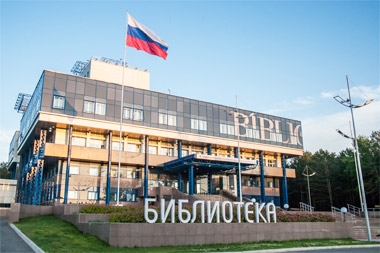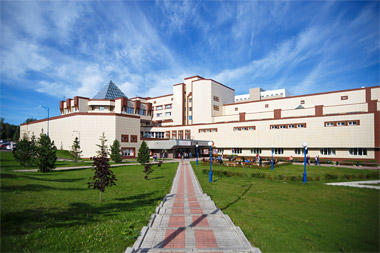The Master's Program "Microprocessor systems" is offered by the School of Space and Information Technologies of the Siberian Federal University. The Program provides training in developing embedded intelligent control systems based on modern microprocessors, microcontrollers and programmable integrated circuits (FPGA, PLD, SoC). In the course of training, students receive skills that enable graduates to perform a full cycle of developing intelligent embedded systems at a high professional level.
The aim
The Master's Program "Microprocessor systems"is aimed at teaching students how to design embedded systems based on modern microprocessors, microcontrollers, and programmable integrated circuits at a high professional level.
Objectives
- Make students familiar with the basic concepts and terminology of the target area, the embedded systems design flow;
- give students an understanding of the embedded system architecture;
- familiarize students with peculiarities of organization and operation of computer systems based on an embedded microprocessor core;
- acquaint students with architectural features of modern FPGA;
- introduce students to SoC architectural features and technologies for making systems based on them;
- train students to put into practice hardware description languages (HDL);
- teach students to use computer aided tools and techniques for designing FPGA/PLD-based devices;
- introduce students to SoC architectural features and technologies for making systems based on them;
- present testing, simulation and verification flow in professional CAD;
- provide insight into low-level and high-level approaches to SoC design;
- teach the basics of SoC design using professional CAD;
- describe international standards of IP block standardization;
- teach the use of standard interfaces, serial and parallel data exchange;
- teach a practical application of methods and techniques for interfacing microprocessors and microcontrollers with sensors and actuators;
- acquaint students with methods of executive device control and to give them opportunity to apply and test those methods in practice;
- teach students to make measurements with the specified accuracy;
- give students knowledge and opportunity to shape a practical skills in the technology of data exchange organization between a microprocessor or microcontroller and memory and peripheral devices;
- provide students with theoretical knowledge and practical experience in digital-to-analog and analog-to-digital signal conversion and interfacing of digital systems with analog devices.
Learning outcomes
Upon completion of this module, it is expected that students will be able to:
- develop software/hardware systems using system-design platform LabView;
- build effective FPGA/PLD designs using professional CAD, Verilog, and VHDL;
- design embedded intelligent control systems concerning executive automation on the basis of microprocessors and microcontrollers;
- design, verify, and test implemented systems-on-a-chip;
- implement circuit solutions for the interfacing of intelligent digital systems with sensor systems and executive automation;
- develop software for embedded systems in C and assembler.
The expansion of the scope of intelligent embedded microprocessor systems is one of the main trends in computer technology. Subject matter experts are in demand in the labor market, but their training requires complex technical equipment found within the educational process, as well as the professional and practical experience of the teaching staff. All these conditions are available to the participants of this Master Program. Formed skills cover the full cycle of intelligent embedded systems development.
Career prospects
Research career: The Master’s degree holder can continue studying to earn a PhD SibFU degree.
Teaching Methods
The module focuses on practical skills in developing embedded industrial purpose systems, generating a "ready solutions" kit for future use in professional activities.
The practical result of learning is an embedded intelligent digital control system of executive automation, implemented in the framework of the Final Project.
Practical classes are held both individually and in groups to simulate teamwork.
Mastering the Program is possible in the blended learning mode.
All lecture material and some laboratory works are available remotely.
Facilities, Equipment and Software
Training is conducted in specially outfitted laboratories with personal workstations equipped with a high-performance PC, control equipment, a set of sensors and actuators, evaluation boards etc.
Students will use such integrated development environments as NI LabView, Atmel AVR Tools, Xilinx Vivado DS, Altera IDE, MathLab.
Program Leader
Oleg V. Nepomnyashcy
 Professor of Computer Science Dept., Head of Laboratory in Microprocessor Systems, School of Space and Information Technologies, Siberian Federal University.
Professor of Computer Science Dept., Head of Laboratory in Microprocessor Systems, School of Space and Information Technologies, Siberian Federal University.
Author and co-author of over 170 scientific publications, teaching aids and patents.
Leader and member of 14 federal-level scientific projects regarding the development of instrumentation and hardware components for the needs of industry, healthcare, aerospace and consumer industry.
Area of expertise:
- High-level VLSI synthesis,
- microprocessor and embedded systems,
- instrumentation and automation,
- CAD of industrial systems,
- development of "system-on-chip."
Additional information is available at: ikit.sfu-kras.ru.
Teaching Staff
Natalia J. Sirotinina
 Ph.D. in Engineering, Associate Professor of Computer Science Dept., Head of Laboratory in Software Development Technologies, School of Space and Information Technologies, Siberian Federal University.
Ph.D. in Engineering, Associate Professor of Computer Science Dept., Head of Laboratory in Software Development Technologies, School of Space and Information Technologies, Siberian Federal University.
Area of expertise
- Neurocomputing;
- Architectures of parallel high-performance computing systems;
- Parallel programming.
Additional information is available at: ikit.sfu-kras.ru
CV (.pdf)
Maksim S. Medvedev
Ph.D. in Engineering, Associate Professor of Computer Science Dept.
| 1 Semester | 30 ECTS credits | ||
|---|---|---|---|
| Master’s Courses | |||
| 2 Semester | 30 ECTS credits | ||
| Special Master’s Courses | Optional Master’s Courses | Master’s Thesis | |
| 3 Semester | 30 ECTS credits | ||
| Module “Embedded Microprocessor systems” | Master’s Thesis | ||
| 4 Semester | 30 ECTS credits | ||
| Master’s Thesis | |||
| TOTAL — 120 ECTS Credits | |||
Core courses:
- Introduction to Embedded Systems
- FPGA/PLD-based Embedded Systems
- Microprocessor Systems
- Systems-on-a-Chip
- The Final Project
| Fields of Study: | FPGA/PLD-based Embedded Systems Microprocessor Systems System-on-a-Chip |
|---|---|
| Duration: | 2 years |
| Starting date: | September, 1 |
| Study intensity: | Full-time |
| Delivery mode: | Blended |
| Type of degree: | M. Eng. |
| Credits: | 120 ECTS |
| Language of Instruction: | Russian |
| Entry requirements: |
Winners of the International Competition "Open Doors: Russian Scholarship Project" can study for free. |
| Tuition fee: | The price will be announced soon. |
| Application deadline: | July 29th, 2018 |
| Accommodation: | On-campus accommodation is available in double and triple-occupancy rooms (€ 20 per month). |
| Practicalities: | Airport transfer and invitation letter for a Russian study visa are provided by the University |
More information?
Please contact our Department of International Educational Programs, SibFU
e-mail: study [at] sfu-kras [dot] ru
phone: +7 391 206-39-28
fax: +7 391 206-21-66
address: 82/6 Svobodny pr., room 427, Krasnoyarsk, 660041 Russia
 VKontakte: vk.com/international_education_sibfu
VKontakte: vk.com/international_education_sibfu
Ask a question
The University
Today Siberian Federal University (SibFU) with over 35,000 students enrolled in its programmes is one of the most actively developing universities in Russia. Annually more than 200 visiting professors — leading scientists from UK, Germany, Spain and USA — deliver their lectures at SibFU.
The University is a winner of the Russian Government grants supporting research projects under the guidance of top-level scholars from Russia and all over the world.
The campus of Siberian Federal University is located in a forested area of the city of Krasnoyarsk. Academic buildings and dormitories of the university are surrounded by natural forest lands and easily accessible by the public transport. More information about the University Campus can be found here.
The City of Krasnoyarsk
Krasnoyarsk is the administrative capital of Krasnoyarsky kray — second largest region of Russia. It is a big industrial and educational centre with a population of more than 1 million people, and also an important junction of the Trans-Siberian Railway.
The city is located on the banks of the Yenisey River in the valley formed by the Eastern Sayan Mountains. Nature reserve Stolby ("pillars") has become the city’s visiting card.
Among the famous people born in Krasnoyarsk are artist Vasily Surikov, opera singer Dmitri Hvorostovsky, biathlete Evgeny Ustyugov, skeletonist Alexander Tretyakov and ice-hockey player Alexander Semin.
In March 2019 Krasnoyarsk proudly hosted the

 Siberian Federal University
Siberian Federal University 




